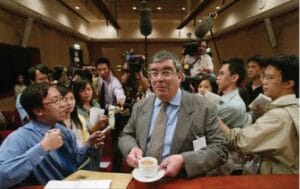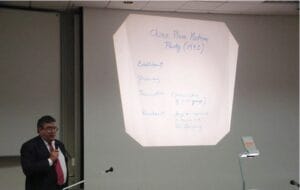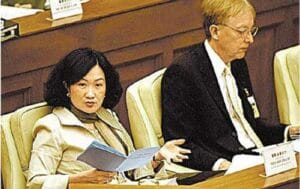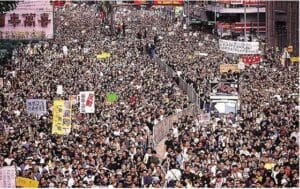EVENTS
Executive Director John Kamm Visits the East Coast for Talks on US-China Relations
Dui Hua Executive Director John Kamm visited Boston, Washington DC., and New York June 3 to June 18, 2018. He was accompanied by Program and Development Manager Yin Yu in Boston and Washington DC, and by Research Associate Ricky Hui in Boston.
Kamm held meetings with State Department and National Security Council officials to ascertain the present state and likely trajectory of US-China relations. He also met with a senior Chinese diplomat as well as senior Congressional staffers, leading scholars, and family members of political prisoners in China. Kamm was granted meetings with everyone he asked to see, no small feat given that his visit took place in the days immediately before the summit in Singapore between President Trump and North Korea’s leader Kim Jong-un.
As one senior State Department official told Kamm, “Relations with China are bad and about to get worse.” Two days after Kamm was told this, President Trump released a list of $34 billion of Chinese goods facing a 25 percent tariff, effective July 6.
Another State Department official said that the State Department’s position on China’s human rights is that “the level of repression is as bad today as it was in the period immediately after Tiananmen.” The two countries are barely talking to each other on human rights.
There are no plans to hold sessions of the four “Strategic Dialogue Mechanisms” announced at the April 2017 Mar-a-Lago Summit between President Trump and President Xi. These sessions, characterized by an American official as a “waste of time,” were supposed to be a forum at which human rights concerns could be discussed.
It was apparent in Kamm’s discussions that the United States was close to deciding whether to quit the United Nations Human Rights Council. American ambassador to the United Nations Nikki Haley announced the decision to withdraw from the council on June 19, calling the body a “cesspool of bias.” While the main reason for quitting the council was bias against Israel, American officials have long complained about the presence on the Council of human rights abusers, including China.
Prior to the American decision to leave the Human Rights Council, discussions took place between Washington and the capitals of “like-minded countries” on crafting a joint statement on China’s human rights, with a focus on the situation in Xinjiang. As it became clear that the United States was going to leave the council, talks foundered. Countries were reluctant to criticize China without America playing a leading role, as it did in April 2016 when twelve countries banded together to issue a scathing attack on China’s human rights record.
Two matters topped concerns over human rights in China: the situation in Xinjiang, where many of the people Kamm interviewed claim that as many as a million Uyghurs have been put in so-called “political education camps,” and Beijing’s refusal at the time to let Liu Xia, the widow of Nobel Peace Prize laureate Liu Xiaobo, leave the country.
A favored approach to reflecting concerns over China’s policies in Xinjiang is the use of Global Magnitsky sanctions against Chinese officials seen to be responsible for carrying out repressive policies in the northwest China autonomous region. A top candidate for sanctions is Xinjiang Party Secretary Chen Quanguo. Sam Brownback, International Religious Freedom Ambassador, reportedly advocated sanctioning Chen in talks with Republican lawmakers in late June.
As for what to do to force Beijing to let Liu Xia leave, an approach appeared to be to reintroduce legislation put forward by Senator Ted Cruz (R-Texas) to rename the street in front of China’s Washington embassy “Liu Xiaobo Plaza.” The bill stalled in 2017 when a Republican senator put a hold on it. The senator, representing a farm state, feared that renaming the street would hurt his state’s exports of agricultural products, but insiders say that the chance that legislation will again be blocked have diminished with China’s threat to retaliate for President Trump’s tariffs by placing tariffs on American farm products. After spending almost eight years under house arrest, Liu Xia was permitted to leave China on July 10 and is now in Berlin.
In the run-up to Kamm’s visit, speculation was rife that the nomination of Susan Thornton, a career diplomat with 25 years of China experience, would be withdrawn due to opposition from two influential Republican lawmakers, Senators Marco Rubio (R-Florida) and Tom Cotton (R-Arkansas). Ms. Thornton announced her resignation, to take effect on July 31, on June 30.
PRISONER UPDATE
Dui Hua research into judicial websites uncovered new information concerning members of an underground opposition group. Official reports have previously stated that Xiang Fengxuan (项逢选) established the People’s Election Party and the so-called “Shadow Corps” with the intention of overthrowing the Communist Party in a violent revolution. Xiang was sentenced to 11 years for subversion in 2017 in Guangdong and is now incarcerated in Yangjiang Prison. Dui Hua’s research revealed that other leaders including Ma Ji (马骥), Yang Wanben (杨万本), Su Dongliang (苏东亮), and Zhang Junwei (张珺玮) were also sentenced for subversion in Guangzhou. Yang and Zhang are known to have been sentenced to four years and five years’ imprisonment, respectively, whereas the sentences received by Ma and Su remain unknown. In June, Dui Hua submitted a prisoner list to its interlocutors to inquire about Ma and Su’s status.
A court judgment Dui Hua discovered online revealed that Cao Haibo (曹海波) received a sentence reduction of five months in April 2016. Cao was sentenced to eight years’ imprisonment for subversion in October 2012. A member of the China Democracy Party, Cao created an online group to discuss politics and the “China Republican Party.” Cao’s posts were reportedly online for only one day. Unofficial media has provided no update on Cao since his imprisonment in Yunnan No.2 Prison in 2012. Cao is now scheduled for release on May 20, 2019 following his first sentence reduction. Dui Hua also learned that the prison filed another sentence reduction application on Cao’s behalf in April 2018.
In June, Dui Hua received information from the Chinese government on thirteen prisoners in Shanghai. Of them, ten were convicted of “organizing/using a cult to undermine implementation of the law.” The response confirmed that two Falun Gong practitioners Bian Jiang (卞江) and Luo Zhijun (罗志军) were released from Tilanqiao Prison in July and November last year, respectively.
The same response also revealed that Jiang Cunde (蒋存德) is continuing to serve his 20-year sentence. Jiang is one of the few prisoners known to remain incarcerated for the now-defunct offense of counterrevolution. Jiang has not received a sentence reduction since his life sentence was commuted to a fixed-term sentence of 20 years in 2004. For more information about his case, please see Dui Hua’s report in December 2017.
PUBLICATIONS ROUND UP
Featured: The Resurgence of Big-Character Posters and Switching Tactics of Criminalization (June 27, 2018)

The iconic big-character posters (dazibao) of the 1970s and 1980s are often thought to have lost their purpose in a China now dominated by smartphones and WeChat. Popularized during the Cultural Revolution, big-character posters were used by competing political factions to instigate “mass mobilization.” In the revision to the 1982 Constitution, the right to use big-character posters was removed. During the June Fourth protests of 1989, the posters became ubiquitous when protesters used them to criticize the path of economic reform. In official narratives, authorities used the word fandong (reactionary), implying a hindrance to progress and reform, to describe cases involving big-character posters.
Previous Digest: June 2018
John Kamm Remembers
John Kamm Remembers is a feature that explores Kamm’s human rights advocacy prior to and since Dui Hua’s establishment in 1999
National Security in the Time of SARS (Part 2 of 2)
To read part one, click here

I decided not to attend the first day of the Hong Kong University conference on June 14, 2003. That evening though, I was invited to attend a dinner at the Hong Kong Club. In attendance were conference participants including local pro-democracy activists and lawmakers. The mood was grim.
The Conference
Earlier that day Legco’s Bills Committee had carried out a “clause by clause” review of the National Security Bill, a process that took nearly eight hours. Many of the legislators in the democratic camp chose not to attend the meeting, preferring to attend the Hong Kong University conference instead. After the review, the Legco committee voted to end debate, meaning that debate could not be reopened, and easing the way for the bill’s adoption by Legco.
All seemed lost. What could be done to stop adoption of the legislation by Legco? I weighed in at the dinner, introducing the Cultural Revolution concept of “raising the red flag to oppose the red flag.” It was often used by Red Guard factions against each other; each claimed the mantle of Mao Zedong thought and used quotations from Mao to undermine the arguments of the faction.
In the case of Article 23, Chinese law was a “red flag,” and set against this was another “red flag,” the Hong Kong National Security Bill. What we needed to do was to show how the Hong Kong legislation ran counter to both the spirit and letter of Mainland Chinese law. Instead of pointing out why the legislation was bad for the human rights of the people of Hong Kong, basing our arguments on the Common Law, we needed to show how the legislation was bad for the people of China based on Chinese law. A long shot, but worth a try.

My panel sat down and shortly thereafter I began my presentation. I went through it point by point, focusing on the 1997 amendment to the Criminal Law that criminalized acts, not association.The next day I arrived at the conference hall to find a packed room of leading legal scholars from around the world, a cohort of Democratic legislators, and the Hong Kong Solicitor General Bob Allcock and his subordinates. Mr. Allcock was head of the Legal Policy Division of the SAR Department of Justice.
I referenced several cases in which individuals had been convicted of subversion after 1997 for undertaking subversive acts. I had been unable to find a single case of someone being subjected to coercive measures for mere membership in an organization. In one case, that of the Chinese Nation’s People’s Party, more than a thousand members of an underground political party had been spared criminal prosecution. Its leaders had been convicted of subversion and sentenced to long prison terms for engaging in activities like organizing meetings, drawing up a manifesto, and raising money.
Reinforcing my point that China did not ban groups on national security groups, I pointed out that it had in fact banned groups like Falun Gong on public order grounds. Article 300 of the Criminal Law made it a crime, punishable by imprisonment, to use a cult to disrupt the administration of the law. If China had banned groups on public order grounds, why hadn’t it banned groups on national security grounds?
I concluded that Hong Kong’s National Security Legislation could not come into force unless and until China’s National People’s Congress amended the criminal law and returned to the “bad old days” of the pre-1997 criminal law, a time-consuming and complicated process that would anger China’s legal reformers who were proud of having removed “membership in a counterrevolutionary group” from the criminal law.
My remarks caused quite a stir. Veteran democratic legislator Martin Lee wondered aloud: “Why didn’t we think of that?” Legislator and union leader Lee Cheukyan delivered impassioned remarks: “We Hong Kong people are so selfish. All this time we have been concerned with how this bill will hurt the human rights of the Hong Kong people. Now we learn that it could hurt the human rights of the entire Chinese nation. We will be condemned as criminals for a thousand generations!”
At this point, Attorney General Allcock addressed me, arguing that there were regulations issued by local authorities that governed registration of organizations. If an organization could not be registered, it was the same as banning the organization. I disputed this. “Refusing to register an organization is not the same as banning it. And, in any event, laws passed by the National People’s Congress take precedence over regulations put out by ministries and local governments. There is nothing in the Criminal Law about banning organizations on national security grounds.”
Albert Chan took the floor. Chan, former dean and current professor of law at Hong Kong University School of Law and a member of the Basic Law Committee, was a respected legal scholar enjoying excellent relations with senior Chinese judicial and government officials. “John Kamm is right,” Professor Chan declared. “For the National Security Bill to be enacted in its present form, Mainland Chinese law would have to be amended. No proscription mechanism as described in the bill exists in Chinese law.”
Bob Allcock was at sixes and nines, the proverbial deer in the headlights. He had lost control of the meeting. He said that the issue I had raised could be discussed at the Legco Bills Committee meeting on June 17. I asked if I could attend the meeting and he said yes.
The next day local newspapers, English and Chinese, were full of stories on what I had done. A headline in the South China Morning Post read “Hong Kong’s Future Autonomy is at Stake, Says Expert.” The stage was set for a showdown between Regina Ip and John Kamm at the Bills Committee meeting on June 17.
Debate in Legco

I showed up at the Legco Building on June 17 at the appointed hour. I took my seat in the gallery above the ornate chamber, looking down on the legislators. Bob Allcock came up to where I was sitting and gave me a handwritten note. An amendment to the bill would be introduced changing the proscription mechanism from “certificate” to “open proclamation.”
The first order of business at the meeting was an attempt by Democratic legislators to rescind the June 14 decision to close debate. All their motions were voted down. Attention then turned to my objection to the bill as presented at the Hong Kong University conference.
Regina Ip tabled the motion to amend the bill by substituting “certificate” with “open proclamation.” This move was met with derision by the Democratic camp. One legislator remarked that after saying debate could not be reopened the government had in fact done just that. Legislators Emily Lau and Margaret Ng, stalwart campaigners for human rights and democracy, claimed that the amendment didn’t change a thing. What was meant by “open proclamation?” Could a newspaper advertisement placed by a local government be considered an “open proclamation?” The government had muddied the waters.
Finally, Lee Cheukyan took the floor. “Secretary for Security, you have said that the bill was subjected to scores of public consultations and 80 hours of debate by Legco. Yet, a foreigner comes to town who has never read the bill, examines it for less than an hour and finds a fatal flaw. What do you have to say to John Kamm?” Pointing at me, he said “Look at John Kamm sitting in the gallery. He is laughing at you!”
This proved too much for Regina Ip. “I am sick and tired of hearing from so-called foreign experts on Chinese law. Sick and tired!” she exclaimed in a high-pitched and agitated voice.
At this point, the Chairman of the Committee meeting stepped in and suggested a brief recess to allow tempers to calm down. I left the gallery and went downstairs to find Martin Lee waiting for me. He ushered me into a room where there were several dozen journalists waiting to pepper me with questions. I made it clear that I was not satisfied with the amendment. The bill was still flawed.
At this point I took a gamble. “The Ministry of Foreign Affairs holds its weekly press conference on Thursday June 19. There are journalists in this room who work for wire services. Why don’t you ask the Foreign Ministry spokesman who is right, John Kamm or Regina Ip?”
In making this move I reckoned that Regina Ip knew as little about Chinese bureaucratic politics as she knew about Chinese law. She had studiously built relations with the Hong Kong Macau Affairs Office, and had largely ignored the Ministry of Foreign Affairs, a bad move. In the event, journalists submitted my question at the press briefing on June 19. The spokesman declined to answer. On June 25, 2003, Regina Ip tendered her resignation as Secretary for Security, citing personal reasons. Later that year she entered Stanford University to study for a Master’s Degree.
As I was exiting the Legco conference room on June 17, two journalists from Apple Daily and Ming Pao stopped me at the door. “What do you think of what Regina Ip said about you?” they asked. I played dumb, “What was that?” “She said that she was sick and tired of hearing from so-called foreign experts on Chinese law. She called you a so-called foreign expert.” I quipped: “I thought she was talking about Bob Allcock.” The press loved it.
Past as Prologue
On July 1, 2003, hundreds of thousands of Hong Kong people took to the streets to protest Article 23. Government officials had predicted that only 30,000 people would participate in the march. The marchers wound through the streets and ended the march by passing by Chief Executive Tung Chee-hwa’s office. They carried placards denouncing “Uncle Tung” and calling for his resignation.

As for me, I returned to San Francisco, but my job was not complete. I penned an article that ran in both English and Chinese newspapers in Hong Kong outlining how the people of China would be hurt if the National Security Bill was passed by Legco and became law.With the desertion of James Tien, leader of the Liberal Party which had supported passage of the legislation, the National Security Bill’s fate was sealed. The government removed the bill from consideration by Legco. Citing health issues, Tung Chee-hwa resigned in March 2005. Mr. Tung remains in excellent health. He had apparently contracted a short-term political illness.
In the summer of 2003, a senior official of the Ministry of Foreign Affairs came to San Francisco and we agreed to meet. He told me that “We know that the Hong Kong government has made many mistakes, but we don’t appreciate our friends pointing them out!” We had a good chuckle.
Fifteen years after the demise of the National Security Bill, China’s leaders, notably President Xi Jinping, are pushing for the SAR to enact Article 23 legislation, perhaps as early as the end of 2018. Opposition among the public to such legislation remains high – Regina Ip, the face of Article 23, received the lowest number of Election Committee votes for Chief Executive in 2017 – but due to changes in the make-up of Legco brought about by the ousting of several recently elected legislators, sanctioning speech and association under Article 23 could well be in Hong Kong’s future.
